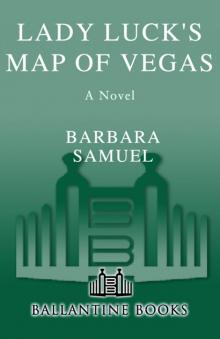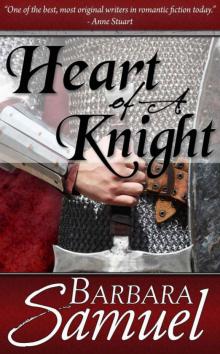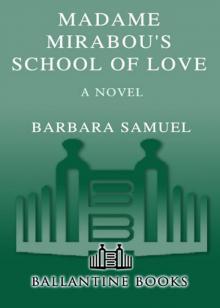- Home
- Barbara Samuel
Madame Mirabou's School of Love Page 2
Madame Mirabou's School of Love Read online
Page 2
I reached for my purse. “I’ll take it.”
Monday looked surprised, but she was no dummy. “Come on downstairs and we’ll write up the contract.”
Looking out the window, I said, “Will she be a good neighbor?”
“Who?”
“The one we saw out there. Madame whoever.”
“Oh, Roxanne.” Something flickered in her young eyes, gone before I could pinpoint it. “Yeah. She’s divorced with two kids, a son and a daughter in their teens—but they’re not noisy. I never get complaints or anything.”
“Has she been here long?”
“A year or so.” She waved me toward the door. “Let’s get back downstairs, all right?”
I wrote out the check a little later, my hands were shaking, but I was relieved to have made some kind of decision. The first one.
2
Nikki’s Perfume Journal
SCENT OF HOURS
Time: midnight
Date: Tuesday, February 12, 1985
Scents: dryer sheets, faint mildew, pepperoni pizza, semen, lemons, white wine, hint of sulfur, touch of chocolate
Bottle: aquamarine cracked glass
Notes: the night I first made love to Daniel
The whole divorce business would have been much easier if I could have said afterward, “Oh, you know I never really loved him.” Or, “Well, we were having problems for a long time. I wasn’t happy and neither was he.” It would have been easier for me and easier for everyone around me if I could have said, like a woman on television did one day: “I’m happily divorced.”
But in my case, it just wasn’t true. I was happy. I loved him, and our rituals, and our family, and our life. I liked the startling couple we made, he so tall and dark, me curvy and fair. I loved how Giselle blended us in a way that was a cut better than either one of us, like a café mocha. I liked going to movies on Sunday afternoons and having dinner together every night, going on vacation every June and rubbing his shoulders when he was tired.
The fact that I loved him and did not want to be divorced and did not—no matter what anyone says—see it coming, seemed to make a lot of people very uncomfortable. It was almost as if my newly unrequited love was in bad taste, that I should get to the truth of the whole matter and figure out why my marriage broke up. Find all those signs that were lurking that I should have paid attention to.
Right. I’d get right on that.
Some of the worst offenders in this were my friends from the old neighborhood. The Wednesday morning after I moved into my new apartment, I had plans to meet them all for lunch at Annie’s Organix, which is the restaurant Pamela often chose when it was her turn. She also shopped exclusively at Wild Oats and ran sixty miles every week. There wasn’t enough fat on her body for even little breasts, just a teeny rise for a couple of nipples.
Not exactly my problem today. My blouse was gaping badly. As I tried to safety pin the placket over my breasts, the doorbell rang. I jerked reflexively and the pin jabbed into my skin. A minute bead of blood appeared, which then soaked instantly into my light pink blouse, which meant I’d have to change, and it had already taken all morning to decide on this one!
In sudden panic, I plucked at my hair, which was too long and raggedy, and suddenly realized that they were going to see me like this. My friends. The girls. My old gang. The well-tended mavens of the old neighborhood.
Damn. I dipped a washcloth in cold water and rubbed at the blood mark. To the universe at large, I said, “Would it kill you to let me look decent for one hour?”
I was nervous. Pam, Kit, and Evelyn were my best friends in the old neighborhood and I knew they’d been worried. They wanted me to stop wallowing now. Move on.
Which, really, I wanted, too. But how?
As I rubbed at the spot on my blouse, I felt myself erecting careful barriers for my squishy self to hide behind. I wasn’t entirely sure why I’d agreed to go to lunch, but in fact, I hadn’t made new friends, and I was sick to death of being alone all the time.
The bell rang again, and I dashed into the living room, startled anew—as I was every time I passed through it—by the room’s absolute beigeness.
“Coming!” I cried.
But when I opened the door, it wasn’t Pamela. It was my next-door neighbor, Roxanne, the one I’d seen the first day. We’d spoken, politely, when we met in the halls, but nothing more.
“Hi,” she said in her throaty voice. “Sorry to bother you. I’m Roxanne, from next door?”
“Sure, hi.”
“Do you have a cup of flour? I was making pancakes for the kids.”
“Isn’t this a school day?”
She inclined her head, and gave me a smile. It tilted her features, making her look very young and mischievous, like an elf. “It’s our family tradition to take a day off to shop for spring clothes.”
“Oh! Fun!” For a minute, I ached to have Giselle with me, so I could make her pancakes, go shopping at the Citadel, maybe. London, which is where her father had taken her, was no doubt more interesting. I was still fairly sure he’d done it, offered the trip over spring break, so Giselle would stay with him, not come to see me as we’d planned. He was furious with me over the house.
“Flour?” Roxanne prompted.
“Right.” I blinked. “I honestly have no idea if I have any. Come in and let me check.”
“Thanks.” She looked around the naked living room, with the row of garden plants in clay pots marching around the baseboards. “Minimalist style! I like it.”
I chuckled. “That’s one way to look at it.”
“Reality is fluid.”
“I’ll try to remember that.” I paused. “By the way, I’m Nicole Carrington . . . er, Bridges.” I shook my head. “I keep doing that.”
“It takes awhile,” she said, and flicked bangs away from her face. She wore her thick black hair in a choppy, trendy cut that was flattering, but added to the tough, take-no-prisoners air around her. Her shoulder blades were sharp as wings. “How long have you been divorced?”
“Almost five months,” I said, stinging with it. “How did you know?”
She lifted one shoulder, and leaned on the counter when I pulled open the pantry door. “You’re living in Splitsville, honey.”
“Splitsville?”
Her smile was sad. “Yeah, that’s what we call this apartment complex.”
“Are you divorced, too?”
She nodded. “I can’t afford to buy a house yet, so here we stay.”
There on the cupboard shelf was an untouched five-pound sack of flour. “Aha! Success.” I gave her the whole bag. “Just take it. I won’t be using it anytime soon.”
“Yeah? All right. I’ll bring you one back when I go to the store later.”
Pamela’s voice sailed into the room from the front door, “Yoohoo! Anybody here?” She came around the short wall, putting her sunglasses on her head, the exquisitely foiled blond of her hair setting off the ice blue eyes. She looked like a travel poster for skiing in Aspen, where in fact, she and her athletic corporate lawyer husband kept a condo. “Jeez, Nicole, this place is empty as a tomb. Where’s the furniture?”
I gave her a look with raised eyebrows. “Hello? Nothing much survived the explosion.”
“Explosion?” Roxanne asked.
“Oh, yeah,” Pam said.
“Long story,” I said to Roxanne.
Pamela extended a hand. “Hi, I’m Pamela.”
“Roxanne.” Her voice was cool. “Thanks. See ya.”
We watched her leave and then Pamela leapt around the breakfast bar. “Give me a hug! I miss you!” Her lean arms were strong and familiar, and she smelled of something citrusy and clean. “You look great!”
“I do not, but thanks anyway.” I brushed at the bloodstain on my blouse. “I’m going to have to change. I’ll be out in a minute.”
“Okay.”
I paused. “You are not allowed to make up lies to make me feel good, Pam. Let’s not do that,
okay?”
“What?” She grinned. “You look better than the last time I saw you.”
“Ha-ha!” It was the middle of the night, when I blew up the house. “I’ll be back in a minute.”
Pamela parked behind the famous old arcade in the center of Manitou, and we walked across the wooden slats over the creek, toward the restaurant. Annie’s Organix was on a side street just off the main drag, but even before we turned the corner, I could smell peaches and cinnamon.
“God, that smells fabulous,” I said, breathing in. “I wonder what her secret is—that’s the best peach crisp in the known world.”
“How do you know it’s not apple crisp? She does both.”
“Because I can smell the peaches.”
“I’ll take your word for it.” She pulled open the door to Annie’s and a spill of scents poured into the street—peaches and cinnamon and coffee; a powdery sort of perfumed bread; and the sharp, astringent scent of dill. “How’s Giselle doing?” she asked.
“Fine, I guess.” A sore spot. “I haven’t talked to her much the past couple of weeks, but she seems to be settling in very well. Straight A’s last semester.”
“It’s killing you.”
If I spoke of it, I’d cry, and I was tired of crying. “Let’s not talk about my daughter, all right?”
It was killing me, the absence of Giselle. I missed my daughter. Not just the presence of her, but all the things I was missing about her life, the dailiness of her coming in from school, chattering or complaining or yawning. The simple grace of her long back as she leaned into the fridge to get milk, serenely talking in the full confidence that I would listen no matter what she said. And she was right, of course.
I miss the smell of her clothes, piled pungently in the laundry room, redolent with her sweat and sleep, a scent I know so intimately you could give me a thousand blouses smelling of a thousand girls and I could pick Giselle’s. I miss the sight of her shoes lying in a tumble by the door and the stacks of her books on the dining room table and the surprising, guttural earthiness of her laughter. I miss the shape of the bridge of her nose and the flutter of her hands and the way she would come into the kitchen and say, “Hey, Mom! Did you know . . .”
She loves me, my daughter, and I love her, and our bond is something I thought could not be breached, not ever, which is why I let her go with her father. Who has loved her more than anything on earth from the very moment of her arrival on the planet. I sometimes think it was his love of her, globalized, that is what led to his lack of faith in us. In me. How could he love me, when I represented the kind of woman who could—theoretically, politically— deprive her?
It’s a twisted logic, but that’s what we get for having such a twisted class structure in this country—all graded out according to a strict point system of coolness.
Oh, wait. America is a classless society. I forgot.
“Are you okay?” Pam asked.
I cleared my throat, trying to dislodge the bitterness clotted there. “Fine.” Spying Kit and Evelyn sitting at the bar, I waved. “Let’s just not make my miserable life the sole topic of conversation at lunch today?”
“No problem. We can talk about me, me, me.”
I gave her a wry smile.
It was busy, and we had to make our way through knots of waiting customers around the old, heavy wooden bar. Kit and Evelyn pinned down the west side of the bar. Kit, a petite blonde with very short, tousled curls, wore a crisp pink blouse and khaki skirt, her legs tanned year-round. She taught fitness classes at the Y, and her forearms were like tiny rectangular planks.
“Hey, sweetie!” she said, kissing my cheek. Her makeup was always so good, I felt slightly skuzzy, and today I wish I’d paid more attention to foundation and powder. She held me at arm’s length. “You look tired. This has been hard on you.”
I want to say, “Duh,” as if I were my daughter. Instead, I lifted one shoulder. “I’m okay.”
Evelyn was the mother of our group, plump in her expensive, ethnic tunic and faux-faded jeans, as bosomy and comfortable as her slightly twangy Texas accent. Beneath the façade, however, was a barracuda, the wife of a mild-mannered computer engineer who’d stumbled into gold in the boom of the eighties. “Hi, Nicole. I’m so glad you could come today!”
“Thanks. Me, too.” I plucked at my bangs, smoothed my shirt. Couldn’t think of anything more to say. It seemed, suddenly, that we didn’t have anything in common anymore.
“How’s everything going?” Kit asked brightly.
“The apartment? I’m in. Got the cable hooked up, everything settled.”
“No, I meant the job hunt.”
“Not great.” Which was a slight understatement. It was not only not great, I had not had one single nibble on anything I’d sent out. Since I hadn’t worked in twenty years and didn’t have much experience before that, it wasn’t a big surprise. Depressing, but not surprising. I’d worked the usual restaurant jobs as a student, then worked in Daniel’s office in a variety of capacities over the years.
Then he hired a secretary. Who applied for, and landed, the job of wife.
“I’ve sent out quite a few resumes,” I said, “but it’s not like I have a lot to offer the market.”
“Oh, don’t say that!” Kit exclaimed. “You’ve done all that fund-raising for the school, and the soccer league.”
“Garage sales, Kit,” I said gently. “People don’t hire you to put on garage sales.”
The bartender set down our mimosas, served in big bowls of wineglasses, with giant strawberries in them. “Enjoy.”
Evelyn lifted her glass. “To fresh starts!”
I snorted. “Be careful what you wish for.”
A small ripple of uncomfortable laughter went around the group as we touched rims. My sense of humor seems to have morphed into something a little brittle. Evelyn’s cheeks reddened. “I meant for you, silly.”
“I know. I’m sorry.”
The hostess, a willowy woman with a longish skirt, came up to us clutching menus in her thin, long hands. “We have a table for you, ladies, if you want to follow me.”
We gathered our drinks and purses and traipsed through the multi-windowed rooms, by little alcoves looking out to the sunny spring day. The light made me long for lilacs, banks and banks of lilacs blooming in the May air, making the air so thick with scent that walking through the neighborhood could perfume your clothes for the evening.
Spring. Fresh starts.
I could use one.
As we passed one alcove, a boisterous round of male laughter exploded out of the room. We four women all turned our heads to look. The men were mostly our age, in their forties or so, a few somewhat younger, all dressed in polo shirts and khakis, with a few wool sweaters. They glanced at us, but we were boring, just like the wives they had at home. A balding redhead with a freckled pate stood up and started talking.
“Blip Data, I bet,” Kit said, mentioning a computer company in town.
“Or Oracle,” Pam offered.
“No, definitely Blip Data.” Evelyn waved at someone. “I recognize half of them. Must be a reward meeting. I heard they’re doing that.”
Since getting divorced, I’d been trying to remember to notice what men look like again. You just get out of the habit, you know, not noticing, unless they’re Morgan Freeman or Russell Crowe or a particularly dashing cellist in the symphony.
I’d been finding it illuminating to notice them now—at the grocery store, at the gas station, restaurants, even in traffic. They tended to get a little too thin or a little too soft in the forties, with only a handful working hard to keep their figures. Many of the best-looking ones were balding, and the ones who had good hair preened about it.
These were computer geeks, and it was easy to pick out the skiers and the runners with their sharp shoulders; the plump dads with their exceedingly white arms. One tall bearded fellow had very good shoulders, and there was a man beside him who was very dark and exotic, a gypsy with bl
ack curls. My type, always. Who knows why? It’s been that way as long as I can remember, since I walked into third grade and sat down next to Alan Medina, the sexiest bad boy to walk the halls of Lincoln Elementary.
The gypsy computer guy looked up, saw me admiring him, and gave me a friendly smile. It shocked me to be caught. I ducked my head without acknowledging him.
Which made me feel like an idiot. I was relieved to be swept into the alcove where our table waited. The hostess left us with menus, and a busgirl rushed over to fill our glasses with water and lime and breathlessly rushed out the specials, a mushroom quiche and a chicken salad sandwich. Soup of the day was a savory pumpkin.
“Aha,” I said to Pam. “There’s the cinnamon, I bet.”
“Right.” She doesn’t care. No one does.
I asked the girl, “Is there cinnamon in the soup?”
“I think so,” she says. “Oh, and the other special today is peach cobbler.”
At that, Pam grinned. “You’re just weird, Nicole. That’s all. Weird.”
Kit plucked out her springy little curls that shone blondly even in the dull light. “By the way, Nikki, I am nearly out of my perfume. Can you make me some more, maybe a bigger bottle this time?”
“I can make some more, but not in a bigger bottle. It won’t work as well.”
“I still say you should open a perfume shop,” Kit said.
“Not practical,” Pam argued. “It would be impossible to make any real money.”
“I think it’s a great idea,” Kit said. She was my main supporter in the group. Evelyn was almost religiously anti-perfume, even when I proved to her that she could wear my perfumes if I knew her list of allergies.
Kit genuinely loved perfume—real perfume, and especially classics like Chanel No. 5 and Joy—and blending one for her had been a challenge and a delight. It took me three years to find exactly the right blend, and when I gave it to her several years ago for her birthday, it was such a hit that she found an antique Lalique perfume bottle on eBay to put it in.

 Lady Luck's Map of Vegas
Lady Luck's Map of Vegas Night of Fire
Night of Fire Rainsinger
Rainsinger Light of Day
Light of Day Heart Of A Knight
Heart Of A Knight The Black Angel (The St Ives)
The Black Angel (The St Ives) Madame Mirabou's School of Love
Madame Mirabou's School of Love